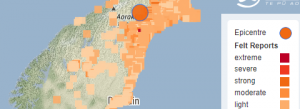New Zealand will end quarantine requirements for incoming travellers and reopen its borders, Prime Minister Jacinda Arden announced Thursday as the country relaxes one of the world’s strictest COVID-19 travel curbs.
New Zealand has enacted some of the world’s most stringent border control measures that left many citizens unable to return home for large periods. Most arrivals had to spend 10 days in quarantine in a hotel room run by the military, a measure that created a bottleneck at the borders.
Also Read | Explained: How did Tonga manage ‘contactless’ delivery of international aid?
While the country was praised in the initial phases of the pandemic for the measures, allowing New Zealand to prevent mass outbreak of the virus and saving lives.
However, the measures have increasingly been looked at as overkill in a world where the virus is becoming an endemic and in a country where the omicron variant is already spreading.
The shortcomings of the system were highlighted over the past week by pregnant New Zealand journalist Charlotte Bellis, who was stranded in Afghanistan after New Zealand officials initially rejected her application to return home to give birth. After international publicity, officials backed down and offered her a spot in quarantine, which she has accepted.
The border changes mean that vaccinated New Zealanders returning from Australia will no longer need to go into quarantine from the end of this month, and vaccinated New Zealanders returning from the rest of the world can skip quarantine by mid-March. They will still be required to isolate at home.
Also Read | New Zealand PM Jacinda Ardern calls off her own wedding amid COVID restrictions
However, most tourists will need to wait until October before they can enter the country without a quarantine stay. And anybody who isn’t vaccinated will still be required to go through quarantine.
Arden acknowledged that while many people associated border control officials with heartache, they have undeniably saved lives. “There is no question that for New Zealand, it has been one of the hardest parts of the pandemic. But the reason that it is right up there as one of the toughest things we have experienced is, in part, because large-scale loss of life is not,” she said.
The controls meant “meant not everyone could come home when they wanted to. But it also meant that COVID could not come in when it wanted to, either,” she added.
Also Read | Officials urge mask-wearing for fans attending Super Bowl
She said that the measures allowed the country to build a strong defence against the virus by vaccinating its population while also keeping the country’s economy stable.
Arden said that the ending of the travel curbs were the first step towards returning to normality.
“There was life before, and now life with COVID, but that also means there will be life after COVID too, a life where we have adapted, where we have some normality back, and where the weather can once again take its rightful place as our primary topic of conversation,” she said.
“We are well on our way to reaching that destination. We’re just not quite there yet.”
Also Read | UK man fined Rs 2 lakh for removing masks for ‘about 16 seconds’
Opposition leader Christopher Luxon said the reopening of the border was welcome news, and his National Party had long called for the government to “end the lottery of human misery.”
(With inputs from the Associated Press)






